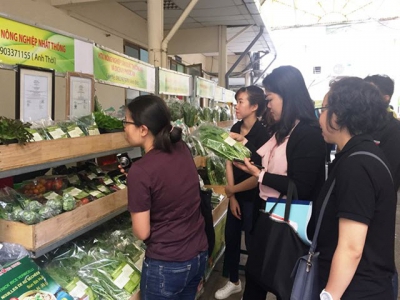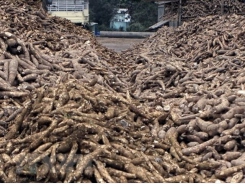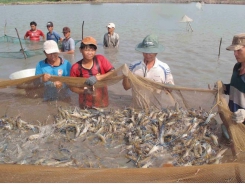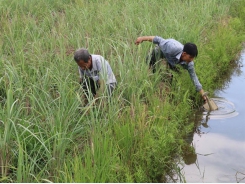HCM City to focus on key agricultural products this year

HCM City will focus on shifting agricultural production to key crops and livestock to raise average production value and farmers’ incomes, Nguyễn Phước Trung, director of the city’s Department of Agriculture and Rural Development, has said.
HCM City’s agricultural sector plans to have at least 60 per cent of all of its vegetables meet VietGap standards this year. — VNS Photo Ngọc Diệp
Trung released the plan’s details on January 8 at a conference reviewing the agricultural sector and its plans for this year.
The city’s key agricultural products this year will be vegetables, flowers and ornamental trees, pigs, dairy cows, brackish-water shrimp and ornamental fish.
The agricultural sector aims to maintain 6 per cent growth in Gross Regional Domestic Product (GRDP), while the average production value of each hectare of agricultural land would rise to VNĐ550 million (US$23,710) from VNĐ502 million ($21,640) last year.
To achieve the target, the city will replace ineffective rice, sugarcane and rubber fields with key products and develop high-tech agriculture, Trung said.
“Research and bio-technology are needed to increase productivity and improve the quality of crop seeds and animal breeds,” he said, adding that the city should become a regional hub for high-quality plant and animal breeds.
The city will also promote crops that meet Vietnamese Good Agricultural Practices (VietGAP) standards or have quality certification, he said.
The city aims to expand cultivation under VietGap standards from 45.5 per cent to 60 per cent of all vegetable gardens, and increase the number of pigs meeting VietGap standards from 45 per cent to 47 per cent of all pigs.
Trần Ngọc Hổ, deputy director of the department, said the city needs new kinds of farming co-operatives that can implement sustainable urban agriculture.
To meet the need, preferential policies will be given to cooperatives so that they will be able to hire quality staff.
Farming households will be encouraged to become members of co-operatives to ensure that production will follow clear planning and have high quality and productivity.
“The city must also provide farmers with better information and forecast harvest volumes as well as supply and demand for each key agricultural crop,” he said.
To increase the value of crops, the city should also promote preliminary processing, processing and trade promotion.
Foreign investment in production, as well as better linkages among producers and businesses, will be encouraged as well.
“This is necessary for sustainability and to continue the national programme on new rural development in suburban areas,” he added.
Consumer trends
Bùi Văn My, director of the agricultural consultancy and support centre under the city’s agriculture department, said a market of farmers on Cao Thắng Street in District 10 that opened in 2016 was successful and replicated in nine locations in districts 1, 2, 3, 5, 6, 10, 11 and Bình Tân and Tân Bình.
My said all of the products at the markets must be certified to meet VietGAP or GlobalGAP standards or organic certification, and that growers and enterprises must be members of the city’s safe food supply chains
“Agencies regularly test samples at these markets for pesticide residue,” he said.
In the past two years, farmers and enterprises have increased cultivation land by 130ha, equivalent to 20,000 tonnes of agricultural products each year.
The revenue from business contracts is estimated at VNĐ22.5 billion ($968,625) per month, while revenue from selling directly at the locations and from orders has reached VNĐ31.5 billion ($1.35 million) per month.
A recent survey of the centre showed that about 60 per cent of consumers are willing to pay 10-50 per cent more for safe products.
“We will open about five new farmers’ market locations to meet consumer demand for safe and quality products across the city,” he said.
Related news
Tools

Phối trộn thức ăn chăn nuôi

Pha dung dịch thủy canh

Định mức cho tôm ăn

Phối trộn phân bón NPK

Xác định tỷ lệ tôm sống

Chuyển đổi đơn vị phân bón

Xác định công suất sục khí

Chuyển đổi đơn vị tôm

Tính diện tích nhà kính

Tính thể tích ao



 Việt Nam exports US$3.5 billion worth of coffee…
Việt Nam exports US$3.5 billion worth of coffee…  Tiền Giang farmers rotate rice with other crops,…
Tiền Giang farmers rotate rice with other crops,…